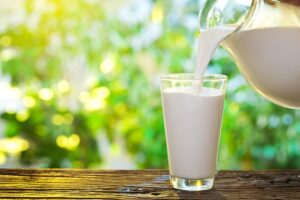
In August 2025, farms of all categories produced 640,000 tons of raw milk, which is 23,000 tons less (-3%) than in July 2025 and 72,000 tons less (-10%) than in August 2024, according to the Milk Producers Association (MPA) citing data from the State Statistics Service.
The industry association specified that in January-August 2025, milk production in Ukraine amounted to 4.69 million tons, which is 239 thousand tons less (-5%) than in the same period last year. In August, enterprises accounted for 42% of raw milk production, while private farms accounted for 58%.
Enterprises produced 268,000 tons of raw milk in August 2025, which is only 1,000 tons less (-0.3%) compared to July 2025, but 18,000 tons more (+7%) compared to August 2024. In January-August 2025, commercial dairy farms produced 2.1 million tons of raw milk, which is 116 thousand tons more (+6%) than in the same period last year.
In private households, milk production in August 2025 amounted to 372,000 tons, which is 22,000 tons less (-6%) than in July 2025 and 90,000 tons less (-19%) than in August 2024. In January-August this year, the private sector produced 2.59 million tons of raw milk, which is 355 thousand tons less (-12%) than in the same period last year.
In January-August 2025, dairy farms increased raw milk production in 15 regions of Central and Western Ukraine. The AVM noted that agricultural enterprises in Zakarpattia region (+29%), Lviv region (+22%), and Khmelnytskyi region (+21%) increased their raw milk production the most compared to the same period last year. The consequences of the war and relocation affected the decline in raw milk production in January-August 2025 at dairy farms in such frontline regions as Zaporizhzhia (-11%), Dnipropetrovsk (-5%), Sumy (-4%), and Kharkiv (-3%) regions.
“Despite Russian missile and bomb strikes, relocation, and rising production costs, the growth rate of raw milk production in Ukraine’s industrial sector since the beginning of 2025 has been one of the best in Europe and the world. In particular, the growth rate of milk yield during this period in the US and New Zealand was +1.4%, while the EU reduced its raw milk production by 0.3%. Although milk yields on dairy farms in August were mostly stable and generally in line with July 2025 levels, the weather this summer was more favorable than last year, and fans were installed on farms to improve cow comfort and prevent heatstroke. This year, we managed to avoid a significant drop in milk production, unlike in the summer of 2024,” said Georgiy Kukhaleishvili, an analyst at the association.
At the same time, according to the business association, milk production in private farms continued to decline on an annual basis.
“It is likely that if private farms do not consolidate by 2030, their milk will no longer be sent for processing and will be used for their own consumption. The work of new dairy farms in western Ukraine will compensate for the reduction in milk production in the eastern and southern regions of Ukraine due to ongoing military operations,” the AVM emphasized.
According to the industry association, the factors that may force agricultural enterprises to refrain from further increasing raw milk production according to the industry association, are the decline in world prices for exchange-traded commodities, weak demand in the domestic market, a reduction in supplies to foreign markets due to the suspension of exports to the EU after the exhaustion of quotas, and increased competition from Russian and Belarusian suppliers in the markets of post-Soviet countries, the industry association believes.
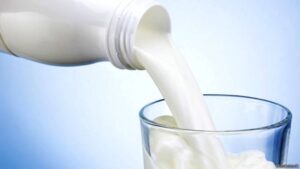
The volume of raw milk supplied for industrial processing in January-June 2025 exceeded 1.8 million tons, which is 10.6% more than in the same period of 2024 and 19.3% more than in the same period of 2023, according to the Ukrainian Dairy Industry Association (UDIA).
The industry association emphasized that the growth rate of raw milk purchases from enterprises in the first half of 2025 decreased to 6% compared to 12.6% in the first half of 2024.
“Raw milk supplies from private farms amounted to less than 94,000 tons,” the UDAU stated.
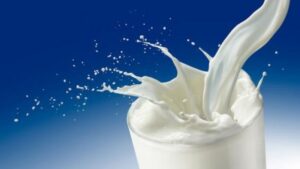
In June 2025, farms of all categories produced 657,000 tons of raw milk, which is 28,000 tons (-4%) less than in May 2025, but 47,000 tons (-7%) less than in June 2024, according to the Association of Milk Producers (AMP) citing data from the Ministry of Economy.
The industry association noted that in January-June 2025, milk production in Ukraine amounted to 3.39 million tons, which is 179,000 tons (-5%) less than in the same period last year. In June 2025, the share of enterprises in raw milk production was 39%, and that of private households was 61%.
At the same time, enterprises produced 257,700 tons of raw milk in June 2025, which is 12,400 tons (-4.6%) less than in May 2025, but 5,000 tons (+2%) more than in June 2024. In January-June 2025, dairy farms produced 1.56 million tons of raw milk, which is 63 thousand tons more (+4%) than in the same period last year.
In June 2025, milk production in private households amounted to 400,000 tons, which is 16,000 tons (-14%) less than in May 2025 and 53,000 tons (-12%) less than in June 2024. In January-June 2025, the household sector produced 1.82 thousand tons of raw milk, which is 242 thousand tons less (-12%) than in the same period last year.
The AVM noted that milk production increased the most in the Lviv (+21%), Zakarpattia (+20%), Khmelnytskyi (+17%), Mykolaiv (+13%), and Ternopil (+10%) regions compared to the same period last year.
“The growth rate of raw milk production in the industrial sector of Ukraine since the beginning of 2025 has been one of the best in Europe and the world. (..) Dairy farms increased milk production despite Russian missile and bomb strikes, relocation, and rising production costs. However, despite the increase in production in the industrial sector, milk yields in private farms continue to decline on an annual basis. It is likely that if private farms do not consolidate by 2030, their milk will no longer be sent for processing and will be used for their own consumption,” said Georgiy Kukhaleishvili, an analyst at the association.
In January-June 2025, dairy farms increased raw milk production in 14 regions. The regions of Central and Northern Ukraine remain the leaders in terms of raw milk production. However, the largest growth in raw milk production is observed in the Lviv, Zakarpattia, and Khmelnytskyi regions, which is associated with the construction of new dairy farms in western Ukraine. They compensate for the reduction in milk yield in the eastern and southern regions of Ukraine due to ongoing military operations.
At the same time, raw milk production at dairy farms in Ukraine is held back by the unwillingness of milk processing companies to buy it at a fair price as farmers’ production costs go up, according to the industry association.
“Domestic milk processing enterprises with outdated technology are unable to compete on quality with enterprises in developed countries. Therefore, they are not ready to buy raw milk at adequate prices, as they sell their products at lower prices to remain competitive in export markets,” the AVM emphasized.
Uncertainty in the market also prevents dairy farms from significantly increasing milk production in the future. After the European Commission canceled autonomous trade measures (ATMs) in June, Ukraine and the EU revised their trade agreement, agreeing on new quotas for Ukrainian dairy exports, provided that Ukraine gradually transitions to EU standards by 2028. However, the new document has not yet been signed due to the position of Hungary, Poland, Romania, Bulgaria, and Slovakia on customs duties and quotas for Ukrainian grain, which are also stipulated in the agreement.
“There is a risk that exports of dairy products from Ukraine to the EU will be suspended next month if the new conditions do not come into force in the near future. In such a scenario, exports of exchange-traded goods to the EU will be suspended, demand for milk from processors may decline, and the emergence of surpluses will negatively affect prices,” the AVM concluded.
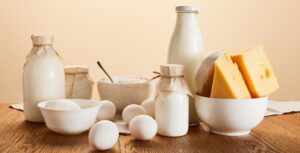
In Ukraine, in June 2025, milk in film, kefir in tetrapak and glass, cottage cheese and Suluguni cheese fell in price, while other dairy products rose in price, the Association of Milk Producers (AMP) reported.
The industry association noted that pasteurized milk with a fat content of up to 2.6% in the film in June 2025 averaged 45.65 UAH/kg, which is 75 kopecks (-2%) less than in the previous month, but 6.48 UAH (+17%) more than in the same period last year.
Pasteurized milk with a fat content of up to 2.6% in a plastic bottle averaged 63.81 UAH/kg, which is 21 kopecks (+0.3%) more than in May and 12.29 UAH/kg (+24%) more than in June 2024. Kefir with a fat content of 2.5% in the film cost an average of 55.54 UAH/kg, which is 37 kopecks (+1%) more than a month ago and 7.98 UAH (+17%) compared to last June.
Sour cream with a fat content of 15% in glasses averaged 191.13 UAH/kg, which is 4.04 UAH (+2%) more than in the previous month and 51.17 UAH/kg (+37%) compared to the same period last year.
The average price for drinking yogurt from 1.6% to 2.8% in plastic bottles amounted to UAH 116.44/kg and was UAH 2.15 (+1.9%) higher than in May and UAH 23.24 (+25%) higher than a year ago.
The average price for cottage cheese with a fat content of 9% was UAH 279.80/kg and was UAH 7.39 (-3%) lower than the average price of the previous month, but UAH 56.50 (+25%) higher than the price in June last year.
Domestically produced butter with a fat content of 72.5% to 73% costs an average of UAH 584.82 per kg, which is UAH 11.18 (+1.9%) more than in the previous month and UAH 162.63 (+39%) more than a year ago.
Dutch cheese with a fat content of 45% averaged 590.64 UAH/kg. Compared to the previous month, the product went up by UAH 12.77 (+2%), and compared to the previous year, it went up by UAH 139.41 (+31%).
The average price of Gouda cheese with 45% fat content from Ukrainian companies averaged 593.14 UAH/kg, exceeding the price of the previous month by 5.74 UAH (+1%), and last June by 131.50 UAH (+28%).
Over the past month, prices for pasteurized milk with a fat content of up to 2.6% in film, kefir with a fat content of 2.5% in tetrapak and glass, cottage cheese with a fat content of 9%, and Suluguni cheese have fallen in Ukraine. Prices for other dairy products in the consumer basket either remained unchanged or went up by 2.9% on average, said AVM analyst Giorgi Kukhaleishvili, quoted in the report.
He noted that butter is rising in price following high global commodity prices. In particular, the price of butter in the EU in May was at the level of EUR7200-7400 per ton, which is almost a record high that has not been recorded since 2017-2018.
Increased supply and consumption of imported cheeses in the domestic market hampers sales of domestic cheese producers. The share of imported cheeses in the domestic market reached 47%, the association stated.
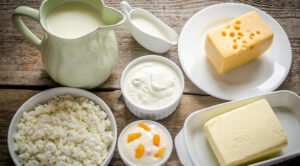
In May 2025, for the first time since December 2024, prices for extra-grade raw milk in Ukraine practically stopped falling and were slightly below 16.3 UAH/kg, according to the expert and analytical service of the Ukrainian Dairy Industry Association (UDIA).
The industry association calculated that the price level in April 2025 (in hryvnia) was 18.5% lower than in December 2024 and 2.5% lower than in September 2024, but 16.5% higher than in June 2024 and 7.5% higher than in December 2023.
At the same time, the average price in May 2025 (domestic quality basis, expressed in EUR) was lower than EUR35/100 kg compared to EUR37.4 in March and EUR40 in February this year and EUR45.7 in December 2024.
The average price, expressed in EUR and converted to the euro base, in May 2025 was lower than EUR 41/100 kg compared to EUR 44 in March and EUR 47 in February 2025 and EUR 53.7 in December last year.
The price level in May 2025 (converted to EUR and Eurobase) was 24% lower than in December last year, 4.5% lower than in September 2024, but 6.5% higher than in May 2024, although still 7% lower than in December 2023.
The ratio between price levels in Ukraine and the EU and Poland averages in May 2025 was 77% of the EU average and 76.5% of the Polish average.
“The corresponding ratio between the domestic price and the EU average price has not been recorded since July 2023,” the SMU noted.
Assessing the situation on other continents, industry analysts noted a decline in milk purchase prices in the US (below EUR41.3), Brazil (to EUR42.3), and New Zealand (to EUR39.5).
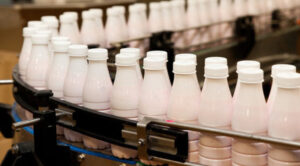
In March 2025, dairy farms of all categories of producers produced 556 thousand tons of raw milk, which is 117 thousand tons or 27% more than in February 2025, but 20 thousand tons or 4% less than in March 2024, according to the Association of Milk Producers (AMP).
The industry association noted that the volume of milk yield in Ukraine in January-March 2025 amounted to 1.44 million tons, which is 53 thousand tons (-4%) less than last year. In March 2025, the share of enterprises in the production of raw milk amounted to 49%, and households – 51%.
According to the report, in March 2025, enterprises produced 272 thousand tons of raw milk, which is 33 thousand tons more (+14%) compared to February 2025 and 16 thousand tons more (+6%) compared to March 2024. In January-March 2025, MTFs produced 771 thousand tons of raw milk, which is 37 thousand tons (+5%) more than in the previous year.
In March 2025, milk yields in private households amounted to 284 thousand tons, which is 84 thousand tons more (+42%) than in February 2025, but 37 thousand tons less (-11%) than in March 2024. In January-March 2025, the private sector produced 676 thousand tons of raw milk, which is 90 thousand tons (-12%) less than in the previous year.
AVM analyst Giorgi Kukhaleishvili emphasized that in the first quarter of 2025, the number of regions where MTFs increased their production of raw milk increased. Khmelnytsky, Ternopil and Zhytomyr regions are among the new leaders in terms of production. However, the increase in milk yields in the industrial sector is not entirely beneficial for the dairy industry amid the unstable situation on the finished dairy products market, the global dairy market, and the unstable dynamics of purchase prices.
“The volume of dairy production in Ukraine is currently outstripping the volume of its sales. The domestic market is experiencing a decline in demand for dairy products amid intensified rocket and bomb attacks by the Russian occupiers on cities with a population of over a million people and the outflow of their residents abroad. At the same time, dairy processing enterprises are striving to help restore demand for dairy products from the population through discounts and promotional offers in retail chains,” the business association explained.
Further increase in cheese imports is also a threat to the development of the industry, at the current rate of imports, by the end of 2025 the share of imported cheese in the Ukrainian market may reach 80%, which will force domestic cheese factories to stop their work and the situation with a surplus of milk may worsen.
The EBA emphasized that the potential threat of foot-and-mouth disease, which has been reported in Hungary and Slovakia, is a challenge for the Ukrainian dairy industry.
“The spread of the disease creates risks of increased culling of infected livestock and the introduction of quarantine restrictions on farms, a ban on the export of dairy products from Ukraine,” the industry association summarized.